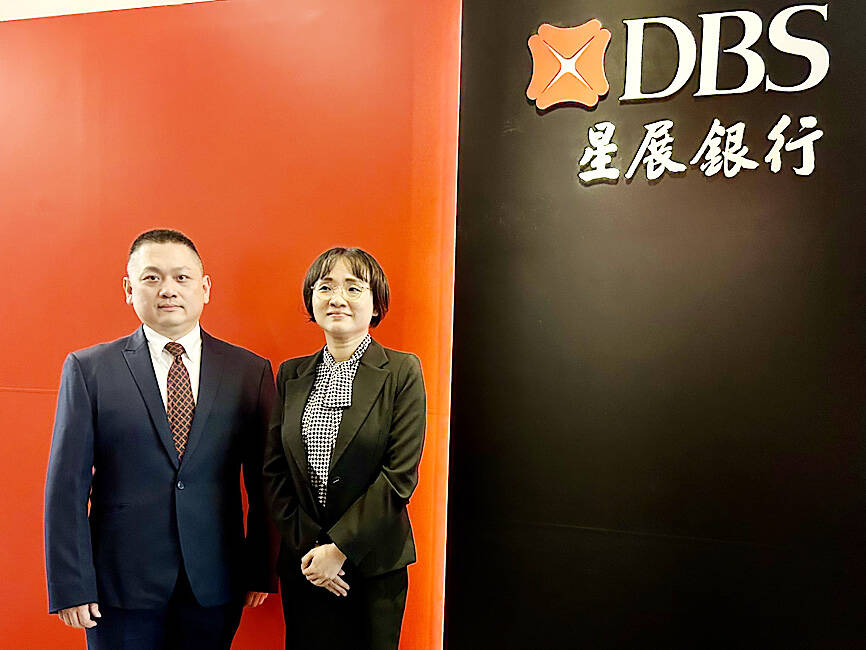Singapore-based DBS Bank yesterday raised its forecast for Taiwan’s GDP growth this year to 4.2 percent, from the 3.5 percent it predicted in April, as the nation’s exports are expected to improve, aided by demand for artificial intelligence (AI) applications.
DBS senior economist Ma Teiying (馬鐵英) told a news conference in Taipei that she was aware the projection is higher than most forecasts, including the Directorate-General of Budget, Accounting and Statistics’ 3.94 percent.
Ma attributed her optimism to a robust recovery and the arrival of the high sales season for technology products.

Photo: AFP
Growth momentum would pick up quarterly, but slow year-on-year due to a base comparison effect, she said.
Generative AI is fueling demand for high-performance AI chips in data centers, as US technology titans Amazon Web Services, Alphabet Inc’s Google, Microsoft Corp and others spend lavishly on developing AI-optimized chips to enhance operational efficiency and reduce costs in delivering AI-based services, Ma said.
AI integration in PCs and smartphones would also present new opportunities for commonly used applications, she said, adding that AI-capable laptops would make up 13 percent of the market this year and soar to 74 percent by 2027.

Photo: Wu Hsin-tien, Taipei Times
At the same time, AI-enabled smartphones would comprise 11 percent of shipments this year and spike to 43 percent in the next three years, she said.
World Semiconductor Trade Statistics recently revised its forecast for global semiconductor market growth to 16 percent year-on-year, up from its previous estimate of annual growth of 13.1 percent, citing robust advancements in memory and logic chip segments, Ma said, adding that the pace of expansion would reach 12.5 percent next year.
Gartner Inc has also projected that global revenue from AI chips would swell 33 percent year-on-year this year to US$71 billion, she said.
However, recovery in non-tech manufacturing sectors would continue to lag, as China’s soft private consumption and property market have dampened demand for imports of consumer goods, Ma said.
In addition, cross-strait tensions have slowed Taiwan’s exports of petrochemicals, textiles, metals, machinery and transportation equipment, she said.
China remains Taiwan’s largest export destination with a 30 percent share, despite efforts to diversify export markets.
DBS stood by its 2.2 percent inflation estimate for Taiwan this year and described the central bank’s monetary policy as moderate, although carrying a tightening bias.
The bullish property market might continue in the coming years on the back of economic improvement until the next negative technology product cycle, likely in 2026, Ma said.
Healthy economic fundamentals might give the central bank room to tighten lending terms, if necessary, to cool the housing market, she said.

KEEPING UP: The acquisition of a cleanroom in Taiwan would enable Micron to increase production in a market where demand continues to outpace supply, a Micron official said Micron Technology Inc has signed a letter of intent to buy a fabrication site in Taiwan from Powerchip Semiconductor Manufacturing Corp (力積電) for US$1.8 billion to expand its production of memory chips. Micron would take control of the P5 site in Miaoli County’s Tongluo Township (銅鑼) and plans to ramp up DRAM production in phases after the transaction closes in the second quarter, the company said in a statement on Saturday. The acquisition includes an existing 12 inch fab cleanroom of 27,871m2 and would further position Micron to address growing global demand for memory solutions, the company said. Micron expects the transaction to

Nvidia Corp’s GB300 platform is expected to account for 70 to 80 percent of global artificial intelligence (AI) server rack shipments this year, while adoption of its next-generation Vera Rubin 200 platform is to gradually gain momentum after the third quarter of the year, TrendForce Corp (集邦科技) said. Servers based on Nvidia’s GB300 chips entered mass production last quarter and they are expected to become the mainstay models for Taiwanese server manufacturers this year, Trendforce analyst Frank Kung (龔明德) said in an interview. This year is expected to be a breakout year for AI servers based on a variety of chips, as

Global semiconductor stocks advanced yesterday, as comments by Nvidia Corp chief executive officer Jensen Huang (黃仁勳) at Davos, Switzerland, helped reinforce investor enthusiasm for artificial intelligence (AI). Samsung Electronics Co gained as much as 5 percent to an all-time high, helping drive South Korea’s benchmark KOSPI above 5,000 for the first time. That came after the Philadelphia Semiconductor Index rose more than 3 percent to a fresh record on Wednesday, with a boost from Nvidia. The gains came amid broad risk-on trade after US President Donald Trump withdrew his threat of tariffs on some European nations over backing for Greenland. Huang further

HSBC Bank Taiwan Ltd (匯豐台灣商銀) and the Taiwan High Prosecutors Office recently signed a memorandum of understanding (MOU) to enhance cooperation on the suspicious transaction analysis mechanism. This landmark agreement makes HSBC the first foreign bank in Taiwan to establish such a partnership with the High Prosecutors Office, underscoring its commitment to active anti-fraud initiatives, financial inclusion, and the “Treating Customers Fairly” principle. Through this deep public-private collaboration, both parties aim to co-create a secure financial ecosystem via early warning detection and precise fraud prevention technologies. At the signing ceremony, HSBC Taiwan CEO and head of banking Adam Chen (陳志堅)